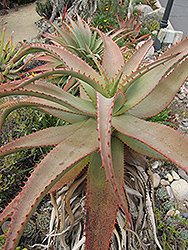Plant Finder
Plant Height: 7 feet
Flower Height: 10 feet
Spread: 4 feet
Sunlight:
![]()
Hardiness Zone: 9a
Other Names: Uitenhage Aloe, African Aloe
Description:
A solitary, unbranched variety producing a beautiful rosette of succulent, sea green, sword shaped leaves with a reddish cast and orange-red thorns; yellow flowers from red buds emerge from erect terminal spikes, usually from mid-winter, into spring
Ornamental Features
Spiny Aloe features showy racemes of yellow flowers rising above the foliage from late winter to early spring, which emerge from distinctive orange flower buds. It has attractive red-variegated bluish-green foliage. The succulent sword-like leaves are highly ornamental and remain bluish-green throughout the winter.
Landscape Attributes
Spiny Aloe is a multi-stemmed evergreen shrub with an upright spreading habit of growth. Its strikingly bold and coarse texture can be very effective in a balanced landscape composition.
This is a relatively low maintenance shrub, and usually looks its best without pruning, although it will tolerate pruning. It is a good choice for attracting bees and hummingbirds to your yard, but is not particularly attractive to deer who tend to leave it alone in favor of tastier treats. Gardeners should be aware of the following characteristic(s) that may warrant special consideration;
- Spiny
Spiny Aloe is recommended for the following landscape applications;
- Accent
- Rock/Alpine Gardens
- General Garden Use
- Container Planting
Planting & Growing
Spiny Aloe will grow to be about 7 feet tall at maturity extending to 10 feet tall with the flowers, with a spread of 4 feet. It has a low canopy with a typical clearance of 3 feet from the ground, and is suitable for planting under power lines. It grows at a slow rate, and under ideal conditions can be expected to live for 40 years or more.
This shrub should only be grown in full sunlight. It prefers dry to average moisture levels with very well-drained soil, and will often die in standing water. It is considered to be drought-tolerant, and thus makes an ideal choice for xeriscaping or the moisture-conserving landscape. It is not particular as to soil pH, but grows best in sandy soils. It is somewhat tolerant of urban pollution. This species is not originally from North America. It can be propagated by division.
Spiny Aloe makes a fine choice for the outdoor landscape, but it is also well-suited for use in outdoor pots and containers. Its large size and upright habit of growth lend it for use as a solitary accent, or in a composition surrounded by smaller plants around the base and those that spill over the edges. It is even sizeable enough that it can be grown alone in a suitable container. Note that when grown in a container, it may not perform exactly as indicated on the tag - this is to be expected. Also note that when growing plants in outdoor containers and baskets, they may require more frequent waterings than they would in the yard or garden.




